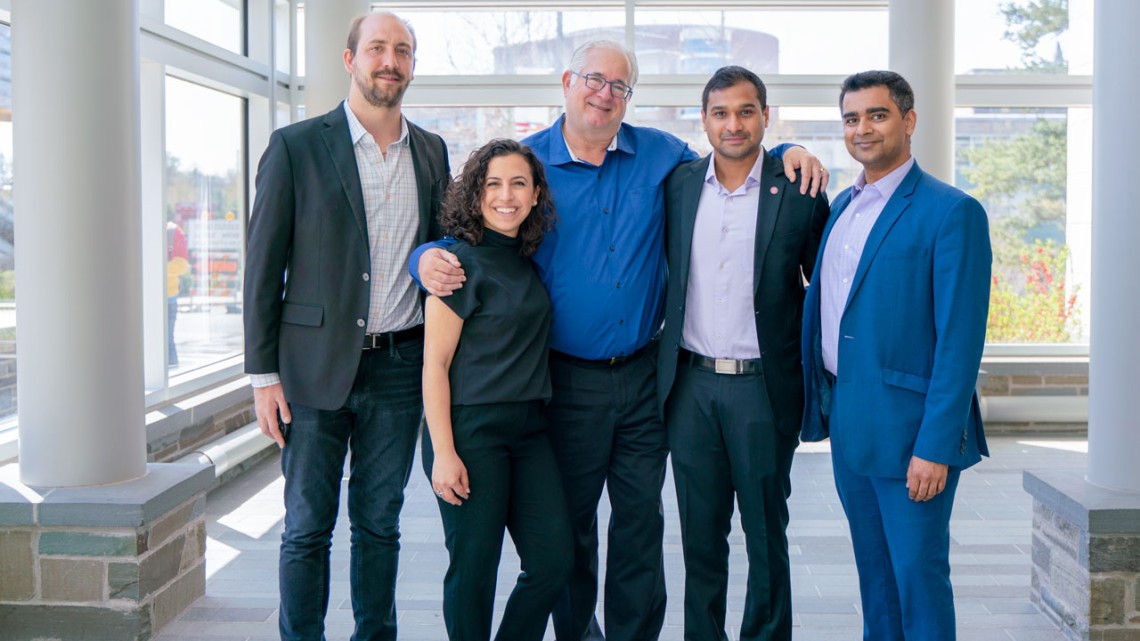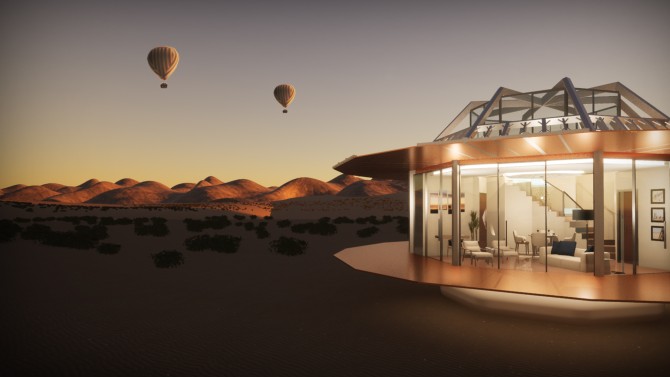
From left, Alan Eduardo Kohlmann, Eden Brachot, Professor Brad Wellstead, Uddhav Prasad and Devashish Sharma pose outside of Statler Auditorium before presenting their winning hotel concept to friends and colleagues.
Hot air balloon hotel concept wins international competition
By Laura Gallup, Cornell Chronicle
Imagine an eco-friendly hotel room that not only has great views but also brings you to your next destination – by hot-air balloon.
That’s the innovative concept from a team of Cornell graduate students that won an international hospitality competition in September.
Four students in the masters of management in hospitality program in the Cornell Peter and Stephanie Nolan School of Hotel Administration won The Sustainability Hospitality Challenge in Dubai. Their winning business plan is for “NIMBUS,” a carbon-neutral hotel room pod that folds up and moves with its guests by hot air balloon, navigated by a pilot. When the pod touches down at a destination, its guests are greeted by other pods with support staff who serve them.
The name of the concept was inspired by dense, puffy clouds with rounded outlines, team members said.
“A nimbus cloud is imposing. You can’t miss it,” said Uddhav Prasad. “But just like the cloud disappears into the sky, the NIMBUS disappears from the destination. The idea is to protect where we travel, and not degrade or deteriorate the environment and ecosystem around it.”
The international competition was sponsored by Neom, a futuristic desert development being built from scratch in northwestern Saudi Arabia. The $500 billion project will be the size of Belgium and will include three main destinations separated by many miles. The objective of this year’s challenge was to create a remote, pop-up mobile hotel concept that allows visitors to travel around this new city – in a sustainable way.
“Tourism sometimes has a negative impact on the environment,” said team member Eden Brachot ’15. “You have a lot of tourist foot traffic, especially to natural sites around the world. And as a result, those sites get a little bit worn out. So, it was really important for us to create a concept that leaves no trace behind.”
The team, rounded out by Alan Eduardo Kohlmann and Devashish Sharma, MBA ’21, heard about the competition from Brad Wellstead, their lecturer in the Nolan School. He acted as an advisor while they worked on the concept for nine months.
The team competed in multiple rounds of in-person presentations, even traveling to Amsterdam, and tweaked their concept along the way. “One of the jurors actually was from Neom and told us about the wind conditions there,” Brachot said. “It inspired us to do a drone-assisted landing.”
The feedback from industry leaders and peers pushed them to contact Cornell alumni at Boeing for aeronautics expertise and decide that a drone attached to the NIMBUS would stabilizes the pod during takeoffs and landings when weather conditions weren’t ideal.
“So if you want to see the desert, and it’s just a little bit windy,” Brachot said, “you won’t have to cancel your trip.”
The team wove sustainability into each aspect of the concept. The pod is constructed from a hemp biocomposite, which sequesters more carbon than it produces, and clad in solar panels. The balloon is reusable and is fueled by low-emissions propane.
Each of the four teammates has a different background and brought their own expertise; Kohlmann in engineering, Sharma in private equity, Prasad in hotel development and Brachot in design. Each also had their own beliefs about the importance of sustainability in hospitality.
“If you’re going to design something, you are consciously making decisions about what’s going to exist,” said Brachot, a former interior designer. “And if you know that it’s going to have a certain lifespan, that in 10 years, everything that you are right now deciding to put in a space is going to be in a landfill, can you just make better decisions about that from the get-go?”
Prasad came to Cornell after working in his family’s hotel business. Opening a hotel in an underdeveloped area develops the entire region, he said. “You can make hotel operation sustainable with using the right materials, using the local vendors, making sure that the people have productive employment.”
Their final product included a slide deck and an animated, architectural rendering video showing what a pod experience would be like. They ultimately beat 44 teams from across the world for the win.
As a prize, the foursome won an all-expenses paid trip to Neom and the opportunity to work with project leaders to potentially make the concept of NIMBUS a reality.
The team members plan to pursue NIMBUS full time and are currently raising a seed round of investment.
“We’ve talked about it every day,” Brachot said, “and we’re all super passionate about bringing it to life.”
Media Contact
Get Cornell news delivered right to your inbox.
Subscribe

